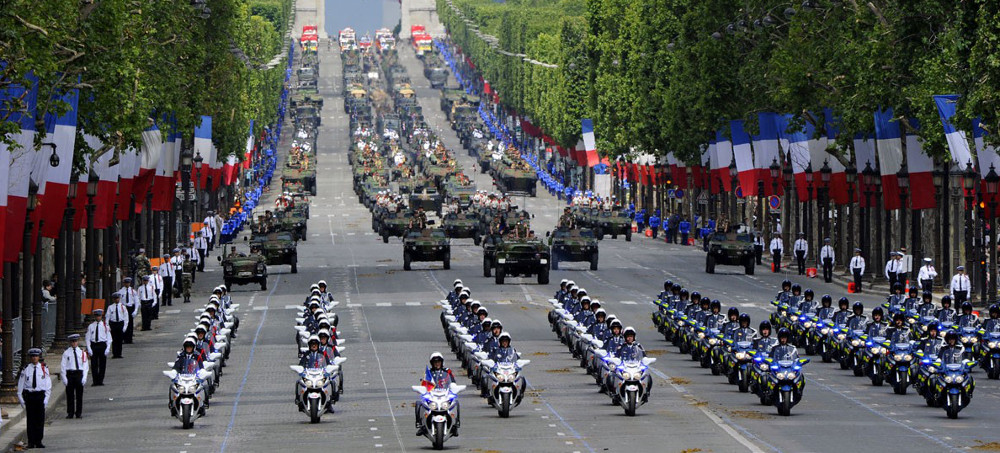Extra: Bastille Day Is For Real Again
Mort Rosenblum Reader Supported News "All that 'military might' on the Champs-Elysées won't be nearly enough to save democracy." (photo: iStock)
"All that 'military might' on the Champs-Elysées won't be nearly enough to save democracy." (photo: iStock) Extra: Bastille Day Is For Real Again
Mort Rosenblum Reader Supported NewsBut this Bastille Day reality bit hard. A precarious present overshadows past glory, from blazing wildfires in heat-parched provinces and lingering plague at home to a cruel war raging 2,000 miles to the east. The French, like the rest of us, have no more margin to get the future right.
The parade’s star was the Jaguar, a Star Wars 6-by-6, 26-ton battle wagon “jeep” with a 40mm cannon on a turret, missile launchers and high-tech gadgetry for combat and gathering on-the-spot intelligence for air strikes and advancing infantry.
This year, firefighters and rescue teams marched along with the military. Canadair tankers for dousing flames joined the flyover.
President Emmanuel Macron, looking back, told TV interviewers what had changed since his first Bastille Day in 2017. “We invested little on defense because the threat was minimal. Now we are catching up fast.” He wants to spend $26 billion in coming years to fortify France’s nuclear arsenal, submarine fleet and cyberwar capabilities.
He did not have to detail why the world has since gone so horribly wrong.
Donald Trump was at the parade in 2017 on his first presidential state visit. He watched with palpable envy at the display of national grandeur and what he called “military might.” The draft-dodger president wanted to do the same next July 4. The Pentagon dissuaded him.
By the time Macron returned the visit in April 2018, allies were alarmed. Trump’s “America First” campaign revealed itself as America only, a thuggish leader’s paean to himself. Macron tried a nice-guy approach. Then in a joint address to Congress, he deftly fileted Trump with rapier strokes.
Trump had torpedoed the 2015 Paris accords, prompting others to renege on urgent action against runaway global warming. He trashed the hard-won deal to stop Iran’s headlong rush toward nuclear weapons. His tariffs and deal-making had crippled multilateral trade.
“Isolationism, withdrawal and nationalism are a tempting remedy to our fears,” Macron said, “but closing the door to the world will not stop evolution…” He added: “If we don’t unite…other powers will not wait one second to advocate their own models to shape the 21st century.” The United States invented multilateralism, he said, and now must preserve it and reinvent it.
He condemned “fake news,” with a brief aside crediting Trump for coining the term, but his definition of it was aimed squarely at Republican truth twisters: “The corruption of information is an attempt to corrode the very spirit of democracy.”
He hit hard at climate collapse. “I’m sure that one day the United States will come back and join the Paris Agreement,” he said. “What is the meaning of our own life if we destroy the planet for our children?”
But Trump toadied to Vladmir Putin while calling European allies ungrateful deadbeats. In 2019, Macron pronounced NATO braindead. Trump had tried to extort Volodymyr Zelensky for dirt on Joe Biden. When he got away with it, Putin drew the clear conclusion and doubled down on Ukraine.
And then Covid struck just as Trump was sucking up to Xi Jinping for a trade deal. We all know the rest.
France, like much of the world, moved swiftly from amusement to disbelief and pity, then utter contempt. America’s closest allies hedged their bets with new trade patterns and international agreements that left out the United States.
Today, France is the strongest military force in Europe. Though weakened by National Assembly opposition from the left and the right, Macron is pushing hard to help wean Europe off Russian energy and counter authoritarian movements in the European Union.
But America is the big dog, like it or not. And many Americans these days, obsessed with their own narrow interests, seem to forget that the rest of the world is watching their follies in real time.
Looking back, the irony was bitter in Macron’s 2018 speech. He repeatedly noted the surroundings, a noble Capitol symbolizing values France and America have long shared. “What we cherish is at stake,” he said. “What we love is in danger. We have no choice but to prevail.”
It is easy to imagine his thoughts on Jan. 6 and during relentless, damning testimony to House investigators. If Trump or anyone else who remotely reflects his thinking seizes power, all that “military might” on the Champs-Elysées won’t be nearly enough to save democracy.
Reader Supported News is the Publication of Origin for this work. Permission to republish is freely granted with credit and a link back to Reader Supported News.
